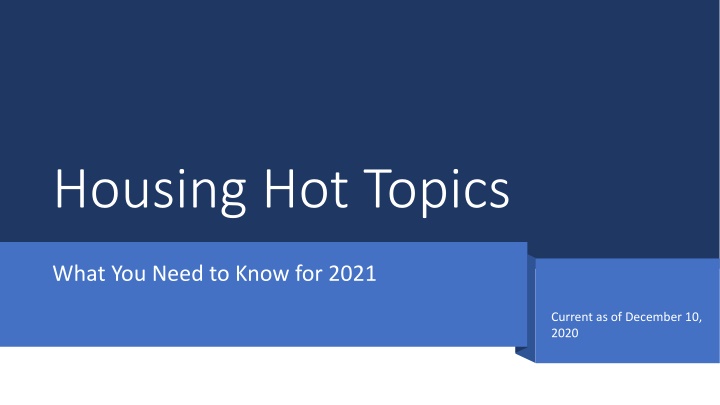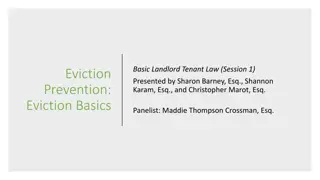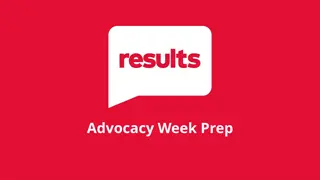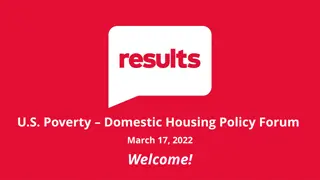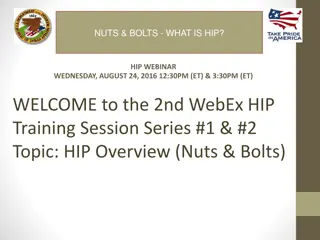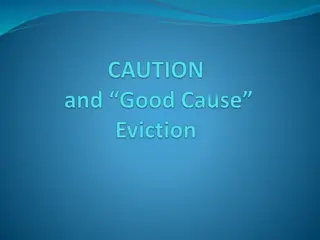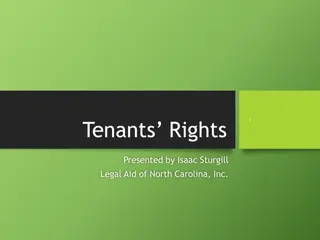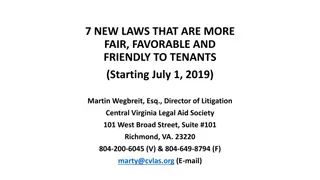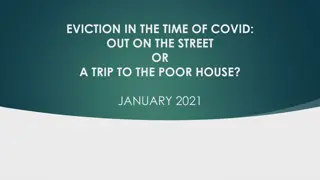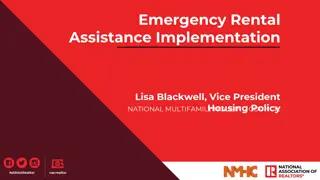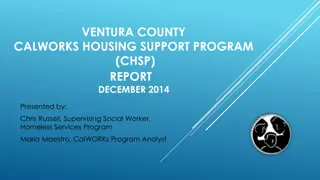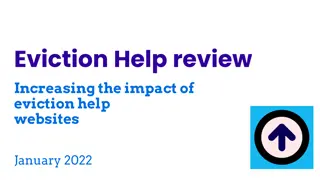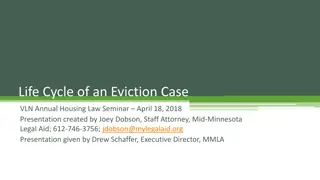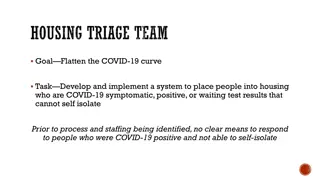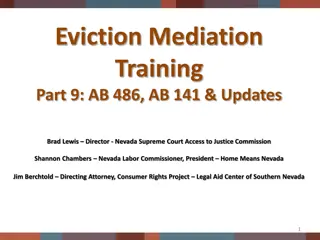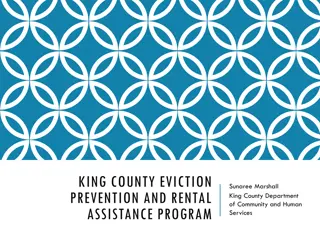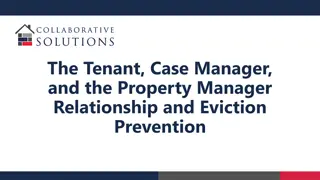Housing Hot Topics for 2021: Eviction Moratorium and COVID-19 Guidelines
Learn about the CDC Eviction Moratorium, guidelines for tenants impacted by COVID-19, and important points regarding rent obligations. Understand the formal declaration process for tenants seeking protection. Stay informed to advocate effectively within the scope of the program.
Download Presentation

Please find below an Image/Link to download the presentation.
The content on the website is provided AS IS for your information and personal use only. It may not be sold, licensed, or shared on other websites without obtaining consent from the author.If you encounter any issues during the download, it is possible that the publisher has removed the file from their server.
You are allowed to download the files provided on this website for personal or commercial use, subject to the condition that they are used lawfully. All files are the property of their respective owners.
The content on the website is provided AS IS for your information and personal use only. It may not be sold, licensed, or shared on other websites without obtaining consent from the author.
E N D
Presentation Transcript
Housing Hot Topics What You Need to Know for 2021 Current as of December 10, 2020
Review the following topics: CDC Eviction Moratorium Eviction vs. Non-renewal of Lease Unique COVID-19 issues Rules Regarding Guests and Inspections Utility Disconnection Energy Assistance Be able to identify cases for advocacy that are also within the scope of EBS program Agenda
Eviction Moratorium Effective September 4, 2020 through December 31, 2020, there is a federal moratorium on residential evictions due to failure to pay rent because of the impacts COVID-19 for tenants that meet certain criteria. Residential property" means any property leased for residential purposes (house, building, mobile home or land in a mobile home park, or similar dwelling)
Eviction Moratorium Important Points It s not automatic. It only applies when each adult residential tenant listed on the lease agreement has provided his or her landlord the following declaration, or a similar document under penalty of perjury, https://www.cdc.gov/coronavirus/2019- ncov/downloads/declaration-form.pdf The CDC Order does not change the tenant's responsibility to pay rent, and any applicable fees or penalties as provided under the lease agreement. If you can pay rent, you should do so. If you are unable to make rent payments during the emergency, you will have a debt for the rent payments that you were unable to make. Late fees and penalties may be assessed on any missed rent payment or any late rent payment that occurred during the effective period of the CDC Order.
Eviction Moratorium Formal Declaration ALL of the following statements must be true: The tenant has used best efforts to obtain all available government assistance for rent or housing; They either expect to earn no more than $99,000 in annual income for Calendar Year 2020 (or no more than $198,000 if filing a joint tax return), were not required to report any income in 2019 to the U.S. Internal Revenue Service, or received an Economic Impact Payment (stimulus check) pursuant to Section 2201 of the CARES Act; They are unable to pay full rent or make a full housing payment due to substantial loss of household income, loss of compensable hours of work or wages, lay-offs, or extraordinary (at least 7.5% of income) out-of-pocket medical expenses; They are using their best efforts to make timely partial payments that are as close to the full payment as the individual's circumstances may permit, taking into account other nondiscretionary expenses;
Any false or misleading statements or omissions may result in criminal and civil actions for fines, penalties, damages, or imprisonment. Eviction Moratorium Formal Declaration ALL of the following statements must be true: If evicted they would likely become homeless, need to move into a homeless shelter, or need to move into a new residence shared by other people who live in close quarters because they have no other available housing options; They understand that they must still pay rent or make a housing payment, and comply with other obligations that they may have under the tenancy, lease agreement, or similar contract. They must further understand that fees, penalties, or interest for not paying rent or making a housing payment on time as required by the tenancy, lease agreement, or similar contract may still be charged or collected; and They understand that at the end of this temporary halt on evictions on December 31, 2020, their housing provider may require payment in full for all payments not made prior to and during the temporary halt and failure to pay may subject the tenant to eviction pursuant to State and local laws.
Eviction Moratorium Other Evictions Tenants may still be evicted for reasons other than not paying rent or making a housing payment. The Order specifically mentions evictions may be based on the following: Engaging in criminal activity while on the premises; Threatening the health or safety of other residents; Damaging or posing an immediate and significant risk of damage to property; Violating any applicable building code, health ordinance, or similar regulation relating to health and safety; or Violating any other contractual obligation, other than the timely payment of rent or similar housing-related payment (including non-payment or late payment of fees, penalties, or interest).
Eviction Moratorium vs. Non-renewal of Lease Landlords are not required to renew leases that expire while the CDC Order is in effect.
Martin has lived in the same apartment for 7 years. His lease says that he pays $500/month and it expires 12/31/2020. Martin fell behind on rent back in September, but his landlord said it s OK because of the eviction moratorium. Martin s been paying a little extra since then, but he s not fully caught up yet. Martin gets a notice in November saying that his lease is not being renewed and that he has to move out by January 1, 2021. Martin calls you and says he s getting evicted January 1. Eviction Moratorium What can you tell Martin?
Sharon calls on Jan. 15 saying that shes receiving all these late fees from her previous landlord. She fell behind on rent in 2020 due to COVID-19, and did everything she could to get caught up. She also completed all the necessary paperwork and qualified under the CDC s eviction moratorium. She moved out Jan. 1 because her lease was up. Sharon didn t have any problems with her landlord, she just needed to find a cheaper apartment, but she thinks any late fees should have been wiped clean by the eviction moratorium. Late Fees/Penalties What can you tell Sharon about her late fees?
Eviction vs. Non-renewal of Lease Eviction Non-Renewal of Lease Failure to pay rent, criminal activity, or other violation of lease Proper notice required based on length of lease No reason needed Proper notice required based on length of lease
Frank had to travel to California for an emergency work trip. He was not in contact with anyone with COVID-19, but he did travel by airplane. His landlord and other tenants in his apartment heard about his trip. His landlord called him before he returned and told Frank he couldn t return to his apartment for 14 days when he got back. Out of caution, Frank had already set up deliveries and necessities to self- quarantine in his apartment for 14 days, just in case. Frank explained this to his landlord, but his landlord said that he was not allowed back in the building because of the compromised health of the other tenants. COVID-19 Tenant Rights What can you tell Frank about his tenant rights?
Exclusive Possession Wis. Stat. 704.05(2)(2) The tenant has the right to exclusive possession of the premises. Exclusive possession means that once a landlord offers a space for rent, a tenant has complete rights to use the space and can do whatever they want within the home as long as it s within the rules of the lease and legal.
Meredith calls you on Monday upset because her landlord gave her a notice that he s coming in the next day (Tuesday) to do her annual HUD inspection. Meredith is immunocompromised and doesn t want anyone in her apartment. She at least would not like to be there when her landlord is, but she would need more time to find a place to go because she is extremely anxious about leaving her apartment for any reason. She thinks that a) her landlord shouldn t be able to come in at all due to COVID- 19, and b) she should have received more notice to figure things out. Inspections rights? What can you tell Meredith about her tenant
Landlord Rights of Entry Wis. Stat. 704.05(2)(2) The landlord may upon advance notice and at reasonable times inspect the premises, make repairs and show the premises to prospective tenants or purchasers. Advance Notice means at least 12 hours unless the tenant consents to a shorter time period, there is a health or safety emergency or if the tenant is absent and the landlord reasonably believes that entry is necessary to protect the premises from damage. (ATCP 134.09) Example: Dane County s current Emergency Order states Landlords or rental property managers may enter leased residential premises and show properties if all individuals are wearing face coverings and maintaining physical distancing.
Arnold lives in low-income senior housing run by the City Housing Authority. His landlord put up signs saying No visitors - No exceptions due to COVID-19. Arnold, however, needs oxygen delivered to his door, and also needs the delivery person to enter his apartment to switch out his tanks. The landlord and Housing Authority stated that they did have a policy allowing caregivers and medical supply deliveries, however, the signs that were posted conflicted and led a person to believe that no such policy would apply. Deliveries rights? What can you tell Arnold about his tenant
Deliveries/Guests Depending on the type of dwelling: Check with the city housing authority Check your county s current public health order Check any HUD policy updates
Per WI Statute, a utility provider cannot disconnect if the utility service provides the primary heat source to your home or impacts the primary heat source to your home (for example, water or steam radiators) Nov. 1 April 15 This is standard each year unrelated to COVID- 19 Utility Disconnections
Available year-round Weatherization Assistance Available Oct. 1 May 15 (heating season) Heating Assistance Electric Assistance Crisis Assistance Furnace Assistance COVID-19: only looking at last 1-month income (not last 3 months) 60% State Median Income (SMI) $ 2,490.08 (Household 1) $ 3,256.33 (Household 2) WHEAP Benefits
As with any housing issue, we always need a copy of the lease and any notices the client has received this is always the first step Our role: Clearing up misinformation regarding the eviction moratorium Helping clients determine evictions vs. non- renewals of leases (and explaining rights/processes) Making appropriate referrals to locate new housing Advocating against discrimination when appropriate Assisting with clients rights with COVID-19-related issues Summary
Resources Eviction Moratorium: https://datcp.wi.gov/Pages/News_Media/LandlordTenantCOVID19FA Qs.aspx WHEAP: http://homeenergyplus.wi.gov/category.asp?linkcatid=239&linkid=11 8&locid=25
